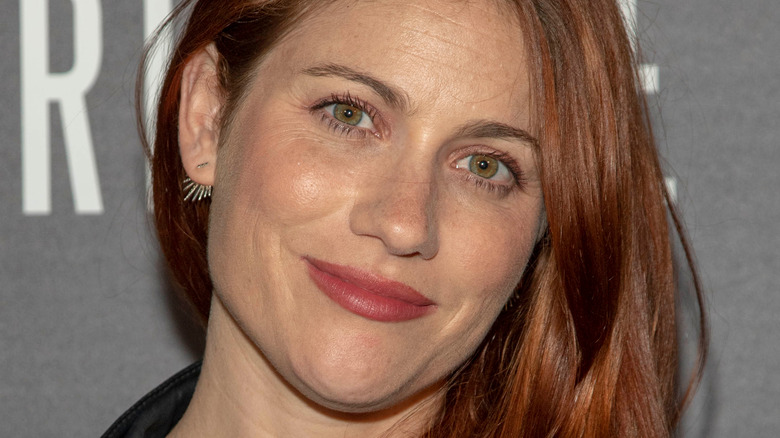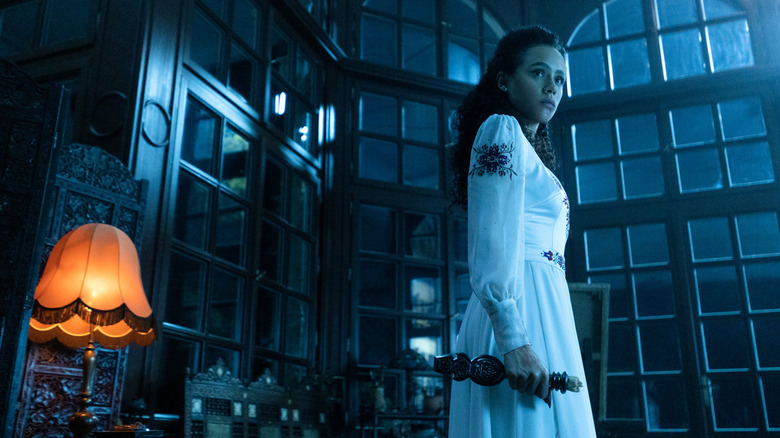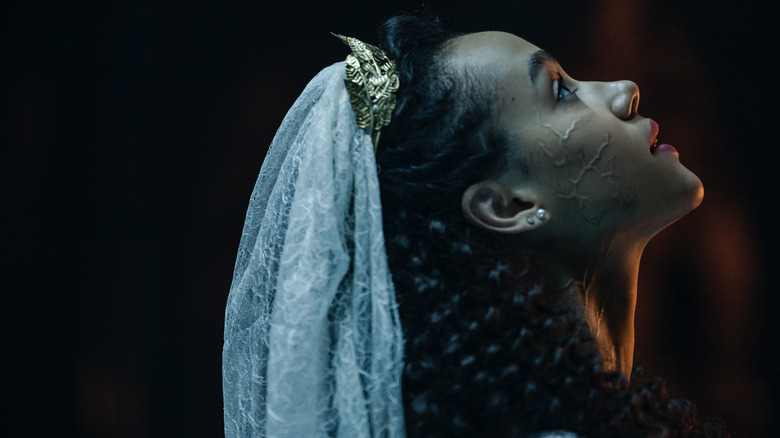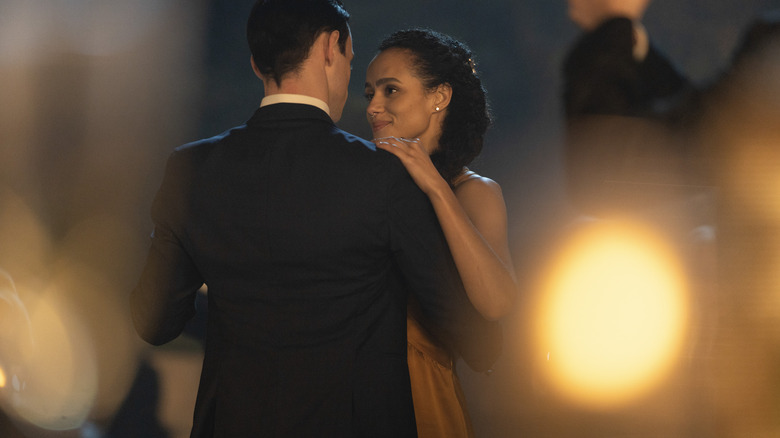The Invitation Director Jessica M. Thompson On The Film's Horror And Feminist Elements - Exclusive Interview
There's no denying that "The Invitation" director and executive producer Jessica M. Thompson understands vampires. It's no secret that vampire projects within the past two decades are somewhat watered down compared to the creatures' haunting origins. Yet Thompson and screenwriter Blair Butler are changing that narrative with a terrifying, genre-bending installment to the genre. The duo penned a slow-burn mystery that feels as much like a true horror film as it does a statement on sexism, classism, and the power of choice (or lack thereof).
The film's horror inspirations are palpable, and "The Invitation" feels like a love letter to the "Dracula"-era vampires mixed with the modern elements that vampire fans have come to love. Of course, "The Invitation" isn't Thompson's first foray into directing. She wrote, directed, and produced her first feature film, "The Light of the Moon" — and even had a cameo as a waitress in the movie. Thompson also directed six episodes of the TV series "The End" and worked on two episodes of "The Handmaid's Tale" as a second unit director.
During an exclusive interview with Looper, Thompson discussed the film's many horror inspirations, revealed the story behind Evie's "Outlander" T-shirt, and went into the film's take on sexism and classism — and how her time on "The Handmaid's Tale" inspired some of those elements.
The Invitation's many horror influences
"The Invitation" is a fascinating take on vampires that gives off some "Get Out" vibes with a dash of high society and cult-like elements, wrapped in the package of a slow-burn mystery. What most excited you about this genre-bending vampire take, and did any other films or shows inspire the direction?
You just summed up the film so perfectly. Yeah, there was a lot of inspiration for this film. I grew up watching horror. I'm a big fan of "The Shining," "The Silence of the Lambs," "Rosemary's Baby," [and] "The Fly." Those were all the things that I grew up on, and I always wanted to make a horror film, so when the opportunity came to me, I jumped on it straightaway. And it was, in particular, this story because I felt like I hadn't seen an origin story of the brides of Dracula. They were always there in the background of other films, but they were never front and center, and that intrigued me.
Also, vampires have always lured me. There's something about them — because they look like us. Throughout history, humans have always known about them, been scared of them, but also been tempted by them. There's something very seductive about them. It's such an interesting genre, and I wanted to put my take on it.
Ditching the damsel angle for vampire love interests
Evie wears an "Outlander" T-shirt in one scene. Is there a story behind that?
It's double-fold. It's like an outlet. What happened is, I never watched "Outlander," and then the pandemic hit, and I watched it, and I binged it in one sitting, pretty much. It's this wish-fulfilling idea — this idea that she's looking for romance maybe, but also, when she steps through the gates, through the doors of that castle, it's almost like she steps back in time. That's the idea that I'm playing with as well.
I also picked up a bit of a "The Handmaid's Tale" vibe from the film as well, which is something that you worked on. Did that series help inform some of the classism elements of the movie?
Yeah, not just classism, but sexism for sure. That's definitely one of the undercurrents and one of the themes. I wanted to make a "me too" film, but I didn't want to make it about any of the horrible, real-life predators that we know. So I thought, why not exemplify that through one of the most diabolical, oldest predators of all time?
Evie is someone, a young woman, who rises up against that, and she's empowered by the end, and she takes charge. Sometimes, the only way to dismantle a system that's as old as patriarchy or colonialism is to go from the inside out. Good picking up on those themes.
A new era for the vampire genre
The vampire genre has gained a bit of a reputation in the past few decades with more watered-down iterations that focus more on romance than the horror aspect of these beings. Why was it important for you to go the slow-burn terrifying route? And what do you think vampire naysayers and fans alike will love about the movie?
Great question. Like I said, I love horror, but I need to care about the characters. If it's just a slasher film ... Don't get me wrong, I enjoy them somewhat, but [in] "Scream" or whatever, [if] I don't care about the characters, then I don't care when they perish. To me, it was important that we actually believe that Evie and Walter [are] falling in love. It's not about the monster under the bed. It's about the monster in the bed. That, to me, is far more terrifying — like "The Shining," which is one of my favorite films. There's always going to be haters out there, but there's a lot to love about this film if people just come in with an open mind.
Also, I already see the comments like, "Why are they walking around during the day?" The thing is, if you go back into real vampire lore, if you go back to Bram Stoker's "Dracula," vampires could walk around during the day. It's really interesting to see how much we think is fact, but it's based on movies or books from the last 30 years and not actually what's based on the original lore. I like to think [there are some] things in there for the historical-true-to-life people and then for a modern audience as well. I think it's got a bit of everything.
"The Invitation" will be released in theaters on August 26.
This interview has been edited for clarity.



